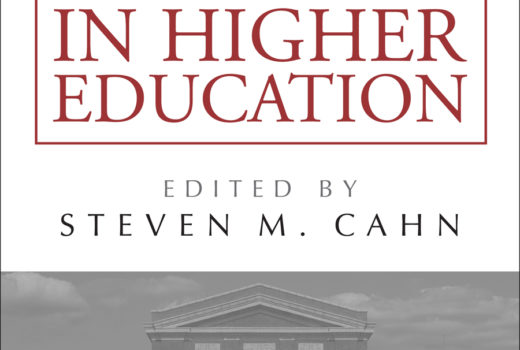 Moral Problems in Higher Education, Steven Cahn, editor, Temple University Press, 2011.
Moral Problems in Higher Education, Steven Cahn, editor, Temple University Press, 2011.
“Few philosophers have shown much interest in examining the moral problems …” in academe, their own bailiwick, complains Steven Cahn, a philosopher and former president of The Graduate School and University Center at the City University of New York (CUNY).
Cahn initiated a course in academic ethics at CUNY and is the author of the 1980s book called Saints and Scamps: Ethics in Academia.
His newer volume, Moral Problems in Higher Education, provides at least two points of view about major and recurring issues in higher education, including hate speech restrictions versus free speech, affirmative action in recruiting students and faculty, the ethical issues around sponsored research, peer review, letters of recommendation, institutional neutrality and university athletics. Cahn recruited more than a dozen philosophers and a few lawyers and former university presidents to offer alternative analyses on moral dilemmas.
The list of readings, some of them classics 20 or more years old, is designed for university courses in academic ethics or contemporary issues.
Education scholars Abigail and Stephan Thernstrom attempt to rebut Derek Bok and William Bowen’s argument that universities must make extra efforts to admit previously excluded and underenrolled racial and ethnic groups. The Thernstroms argue that this policy parallels the caps on Jews at selective ivy colleges decades ago and could jeopardize the opportunities for high-scoring Asian students who enroll in high numbers at California public universities today. How do universities expand opportunity and play fair with all qualified applicants?
University athletic programs on occasion fall victim to highly publicized betting and athlete recruiting scandals. Provoking thought are the arguments of Myles Brand, a philosopher and president of both the University of Oregon and Indiana University who went on to direct the NCAA. He contends that physical health, once celebrated by the Greeks, has been subordinated to the humanities including the fine arts. He would have universities treat athletic directors as deans and members of the president’s cabinet, and basketball treated with the cultural enthusiasm afforded ballet! Universities provide “entertainment” in the form of concerts and plays, so why not respect football games as well?
Ours is an age where candor and transparency are honored. But are there limits? What about academic references? One chapter features an amazingly honest (mock) letter of recommendation for a doctoral student performing in the “third quartile” that might never become a great scholar but could probably be relied upon to meet classes. Philosophers can provoke us to discussing moral issues with humorous examples.
Universities, one philosopher contends, should be, but cannot be, completely “neutral”. Over the past decades, they have contracted with the Department of Defense and pharmaceutical companies, allowed the CIA to recruit graduates on campus, and accepted funds from donors with questionable values and habits. Avoiding outright partisanship, how do colleges and universities find a moral compass to guide the turning down of gifts and contracts that might compromise the integrity and independence of the campus?
Study questions follow each chapter. This book would be useful for courses in higher education leadership or new president seminars offered by collegiate associations and schools of education. We yearn for morality in public life, and need more discussion of the moral issues facing higher education.
Joseph M. Cronin is former president of Bentley University.
[ssba]
